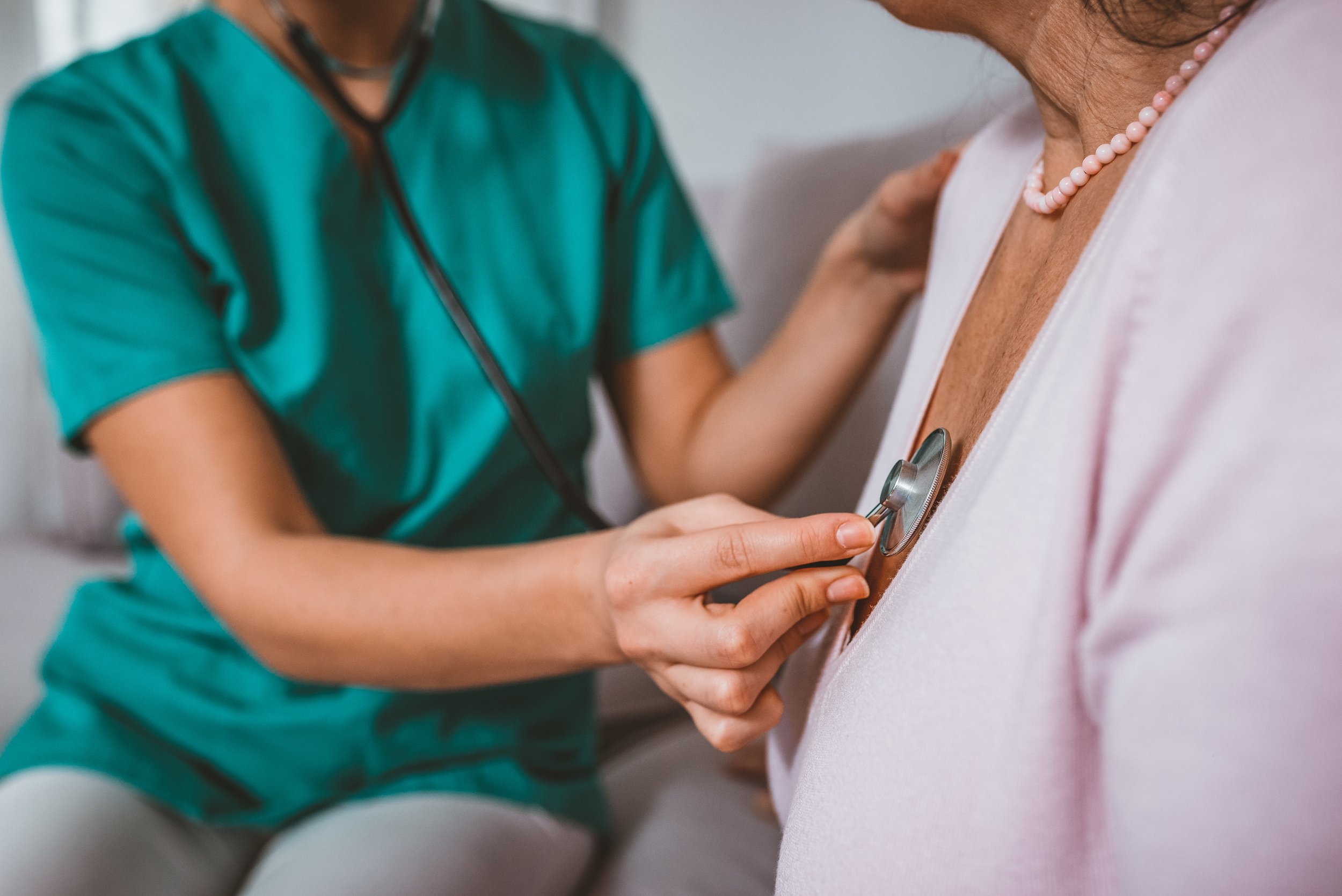
Your journey with heart valve disease
Whether you’ve just discovered a heart murmur or are awaiting treatment for a valve problem, it can be reassuring to know what comes next. While everyone's experience with heart valve disease will be different, this page outlines the optimal care journey.

Awareness
awareness
Awareness of symptoms is the first step in the patient journey. The signs and symptoms may be difficult to recognize as they vary between individuals and often mimic general signs of aging. As a result, people may live a long time with heart valve disease without recognizing that anything is wrong.
Symptoms of heart valve disease may include:
Fatigue or reduced exercise ability
Shortness of breath or fatigue after a previously normal amount of activity
Irregular heartbeat
Dizziness
Chest pain
Fainting
Ankle swelling
“If you experience any of these symptoms, see your healthcare provider and ask for a stethoscope check. ”

Detection
Detection
“Every Canadian over 60, or with a pre-existing valve condition, should have a stethoscope check as part of routine check-ups.”
Heart valve problems are often first detected during a routine medical exam when your healthcare provider listens to your heart with a stethoscope and hears an extra noise called a murmur.
A murmur does not necessarily mean you have heart valve disease. Depending on what your healthcare provider hears, you may be sent for further tests.

Diagnosis
Diagnosis
After detecting a murmur, your healthcare provider should refer you for an echocardiogram. This will help determine if the murmur is related to heart valve disease.
An echocardiogram uses sound waves to create images of your heart and valves. It is one of the more common diagnostic tests. In addition, your healthcare provider may recommend one or more of these tests, to help them come to the right diagnosis:
Electrocardiogram (ECG) to measure your heart’s electrical patterns
Chest x-ray to look for fluid in your lungs or enlargement of your heart
Cardiac magnetic resonance imaging (MRI) to create detailed images of your heart
Exercise or stress tests to see how the valves change or symptoms develop with exertion
Cardiac catheterization to examine blood flow and test how well the heart and valves are functioning
“If you’re diagnosed with heart valve disease, it’s important to have your heart checked regularly, even if you feel well.”

What happens after diagnosis
Hello, World!
“The symptom tracker was developed to help you capture new and changing symptoms to help you and your doctor understand your health and assist with care planning.
”
After you are diagnosed with heart valve disease, you will likely be referred to a cardiologist or a specialized heart valve clinic. They will work with you to monitor your heart and develop options for treatment if needed.
Every person diagnosed with valve disease will have a different experience, depending on the severity of your condition, its impact on your daily life, and other factors. If your disease is mild, lifestyle changes and monitoring can be the right choice for several years. For more severe disease, it’s best to start exploring treatment options.
If your heart valve disease is being monitored, it’s important to watch for any changes in your symptoms. When you notice something new, or a change, don’t dismiss it. Book an appointment to share the information with your healthcare provider.
Learn more about specific conditions that impact the heart valves:

Treatment and follow-up
Treatments for heart valve disease are based on many factors including your age, your general health, which valve is affected, and the type and severity of your condition.
If your heart valve condition is mild, you may not need any treatment beyond regular check-ups to monitor your condition, and, possibly, medication to help manage any symptoms.
If your condition is more severe, you may need treatment. Options include valve repair or replacement, in combination with medication.
You and your healthcare provider will discuss treatment options and decide together which is best for you and your circumstances.

Shared decision-making
If you’ve been diagnosed with heart valve disease, you may be faced with a wide range of treatment options. Shared decision-making involves working together with your healthcare provider to choose the most suitable treatment, based on your preferences and goals, as well as clinical evidence and the expertise of your healthcare team. These resources can support you to participate in decision-making about your care.
This patient-centred webinar from Global Heart Hub and Heart Valve Voice Canada shows you how to collaborate in decisions around your treatment.

recovery
Recovery: What to expect after treatment
Each person’s path to recovery will look different. Your treatment plan will be unique to your needs, and likewise, your recovery — the time it takes to return to a normal activity level and adapt to lifestyle changes — may vary from what others experience. Taking time to recover, both physically and mentally, is an important part of your journey.
After treatment, ask about getting access to these if you have not already been referred:
A cardiac rehabilitation program
An echocardiogram 30 days after treatment
Psychological support and counselling
Periodic check-ins with your healthcare provider
“Recovery looks different for every person.”
Reducing your cardiovascular risk factors and related conditions is an important way to ensure the most positive outcome from your treatment. Advice may include getting regular exercise, maintaining an optimal weight, and quitting smoking. You may also be prescribed medication to reduce high blood pressure or improve diabetes management.

Frequently asked questions
What do I do if my doctor detects a murmur?
If your healthcare provider detects a murmur during a regular check-up, they may arrange for you to have one or more follow-up tests to help identify the cause. A murmur is not always a cause for concern. You may have a mild form of heart valve disease or sometimes hearts produce a murmur with no apparent cause. The follow-up tests will determine if you have heart valve disease and how to treat it.
What complications can occur with heart valve surgery recovery?
It can take up to 6-8 weeks to fully recover from heart valve surgery. During this time, it is not uncommon to experience fatigue, restless sleep, discomfort around the surgery site, poor appetite or constipation, mood swings, or shortness of breath. These symptoms will gradually improve.
Serious complications are rare but it is important to monitor for the following:
• Signs of infection at the surgery site include redness, swelling, any new drainage/fluid, or the development of a fever.
• Symptoms such as persistent headaches, dizziness, new chest pain, or if you start to feel really unwell.
If you begin to experience any of these signs of serious complications, it is important to contact your healthcare provider immediately or go to the emergency department.
If I have no symptoms, does that mean my heart valve disease is mild?
No. You can have severe valve disease and feel fine. That’s why it is important to have a healthcare provider to assess your heart regularly.
Is it true that you should sleep on your back and not on your side after heart valve surgery?
Getting enough sleep is an important part of recovering from heart valve surgery. For the first few weeks, sleeping on your back keeps your chest and incision stable while they are healing and, additionally, may feel more comfortable because it puts your body in good alignment.
Are some people too old to undergo a valve replacement?

Protecting your heart health
Many people with heart valve disease can live a healthy life. Here are some things to be aware of:
You may need to take antibiotics before dental appointments. People with heart valve disease should prioritize good dental health, as oral hygiene is linked to overall cardiovascular well-being. Daily flossing and brushing are important, as are routine dental check-ups and cleaning. Talk to your dentist or healthcare provider about taking antibiotics before appointments to prevent infection.
Likewise, you may need to take antibiotics if you are undergoing any medical procedure involving your respiratory system (for example tonsillectomy, bronchoscopy or adenoidectomy). Talk to your healthcare provider about your options.
Heart valve disease can increase your risk of developing heart failure, where your heart muscle isn’t strong enough to pump blood through your body. That’s why it is important to be aware of your symptoms and report any changes in your health to your healthcare provider.
Cardiac rehabilitation will help you regain your strength and reduce your risk of having other heart problems in the future. Talk to your healthcare provider about how to find a program in your area, or contact your public health department or hospital.
It’s important to do everything you can to avoid common infections including flu. Staying up to date with vaccines to prevent COVID-19 , flu and pneumonia is a proactive way to stay healthy.
Get a test for Lp(a), a protein in your blood that could increase your risk of aortic stenosis, heart attack and stroke.
Patient stories

Advocating for a better patient journey
Heart Valve Disease: Working together to create a better patient journey is a first of its kind report providing a comprehensive view of the heart valve disease patient journey. The full report spans the journey from awareness and detection through diagnosis, monitoring, treatment, and follow-up, identifying gaps. It includes patient stories and recommendations for improving care. It is a summary that provides clear guidance and a road map to help Canadians seek optimal care for themselves.
Read the report to help support your care and guide your heart valve disease journey.



